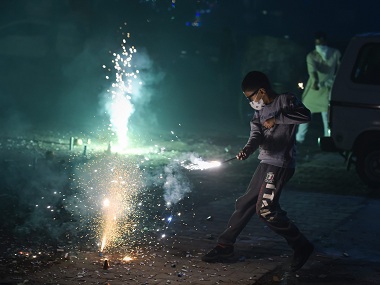The Supreme Court has allowed only two crackers — green and silent version of the anar (flowerpot) and phuljari (sparklers) — this year for Diwali celebration in Delhi, in order to curb air and sound pollution in the national capital, reports said. According to an
NDTV report, all other crackers that make noise or are potentially harmful to the city’s air quality stand banned following the order. [caption id=“attachment_5518821” align=“alignleft” width=“380”] Delhiites would have to remain content with only anars and phuljharis for Diwali this year. PTI[/caption] “Only green crackers are allowed and we have constituted teams to inspect the sellers’ stocks. If anyone is found selling any other type of crackers, legal action is being taken against them,” said MS Randhawa, a spokesperson of Delhi Police, according to the report. To ensure that citizens are able to discern the legally allowed crackers from any fake goods that make their way into the market, the government has put an official stamp and a QR code on the packaging. The Delhi Police has advised buyers to check for an official stamp on the crackers to know that they are buying legal ones. The crackers will come in two colours each and a box of 50 ‘phuljaris’ or five ‘anars’ will cost Rs 250. These green crackers, according to government claims, causes 30 percent less air pollution. The production of these environmentally safer “green crackers” was initiated by the Council of Scientific and Industrial Research (CSIR), commissioned in response to a petition filed by three children in 2016. That same year, the Supreme Court banned the sale of any and all firecrackers in the entire national capital region. In September 2017, the ban was temporarily lifted, and a greener approach advocated. However, a month later, the ban was reinstated and more environmentally-friendly approaches looked for. In 2018, the national capital witnessed its second-highest pollution level in December with authorities saying unfavourable meteorological conditions were likely to keep the air quality in the severe category for a few days. The Central Pollution Control Board (CPCB) data showed the overall air quality index (AQI) at 446 while the Centre-run System of Air Quality and Weather Forecasting (SAFAR) gave a much higher AQI of 471. The CPCB-led task force held a meeting in response to the high PM2.5 (fine particulate matter in the air with a diameter of less than 2.5 micrometres) levels which climbed to the severe plus emergency category. Exposure to PM2.5 pollutants can lead to diseases like cancer and increases chances of stroke. The previous highest recording of that year was 447 on 15 June, when there was a dust storm. (With inputs from PTI)
The crackers for Diwali will come in two colours each and a box of 50 ‘phuljaris’ or five ‘anars’ will cost Rs 250. These green crackers, according to government claims, cause 30 percent less air pollution – a growing concern, especially in Delhi.
Advertisement
End of Article


)

)
)
)
)
)
)
)
)



